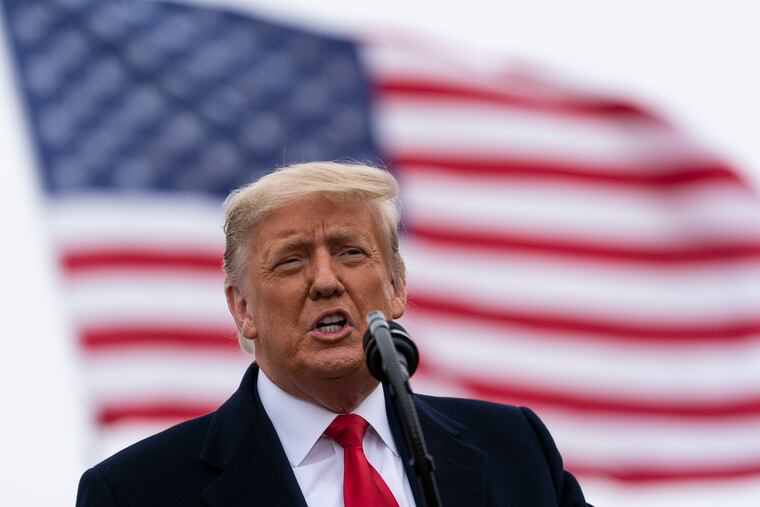Trump frees aides from ethics pledge and lobbying ban intended to ‘drain the swamp’
The ethics pledge was outlined in one of Trump’s first executive orders, signed on Jan. 28, 2017, as part of his campaign pledge to “drain the swamp.”

WASHINGTON — Donald Trump, in one of his final acts as president, released current and former members of his administration from the terms of their ethics pledge, a move that once again laid bare the failure to meet his 2016 campaign promise to “drain the swamp.”
Trump won the presidency, in part, on a pledge to take on entrenched special interests in Washington, and his ethics policy was one of his first acts after assuming office.
But in practice it proved to be little more than bluster. Trump instituted a major loosening of ethics standards when compared with the administration of his predecessor, Barack Obama, as well as the rules that will govern Joe Biden’s White House.
While Trump’s policy ostensibly included a five-year ban on former officials lobbying their former agencies, it also included large loopholes that allowed many to skirt the rules. The administration also avoided enforcing it, government watchdog groups say.
By rescinding his ethics executive order before leaving office, Trump is freeing former officials from any lingering concern that they could face consequences for running afoul of the ethics policy as they return to the private sector. Many of them will now try to leverage their experience to secure high-paying jobs in Washington’s influence industry.
“The first rule of ethics enforcement is you need to have strong standards. Then you need to back them up with intense transparency. And you also need to reinforce the whole thing with tone from the top. Trump did the opposite on all three,” said Norm Eisen, Obama’s former ethics czar. “He made a mockery of it by having a corrupt tone at the top.”
Unlike his predecessors, Trump refused to divest from his sprawling business empire. That set the tone for his tenure, while making it easy for foreign and domestic interests to try to influence U.S. policy by patronizing his hotels, restaurants, golf courses and private clubs.
Trump signed the one-page revocation of the ethics order on Tuesday, and it was released by the White House shortly after 1 a.m. Wednesday, hours before his term ends.
The decision is not without precedent. President Bill Clinton signed a similar order with weeks left on his final term, allowing former aides to go directly into lobbying after leaving his administration.
The White House did not respond to a request for comment on Wednesday morning.
Appointees who join Biden’s administration will face far more stringent ethics rules that are more in line with those of Obama’s administration — and in some ways go further.
Under an order Biden is expected to issue, officials who leave the administration will be prohibited from lobbying the White House or executive branch agencies for Biden’s duration in office. Those who depart toward the end of Biden’s tenure will be prohibited from lobbying the White House for at least two years.
One provision prohibits incoming administration officials from accepting “golden parachute” payments from their former employers for taking a government job.
Another restricts former senior level staffers not just from lobbying the administration for at least two years, but also prohibits for a period of one year working behind the scenes to materially assist others who do lobby the executive branch. That’s a practice often referred to as “shadow lobbying.” Typically such people do not have to register as lobbyists, even though they play a key role.
The ethics order was described by a Biden transition official on the condition of anonymity because the order has not yet been made public.
One key area that Biden has not addressed in detail is how his White House will address potential conflicts of interest posed by members of his family, some of whom have personally profited by leveraging the Biden name.
Biden repeatedly said on the campaign trail that during his decades in public office, he has never talked to any family members about their private business dealings. And he promised “an absolute wall” between government and his family’s financial interests.
But specifics of how his pledge will be enforced remain unclear.
A person familiar with the incoming administration’s plans said Biden’s family members will not serve as employees or as board members for foreign companies. Additionally, the person said there will be a review process to ensure the Biden family’s business dealings do not present even the appearance of a conflict of interest.
The person insisted on anonymity to discus internal deliberations.
Biden’s son, Hunter, has worked for foreign entities in the past, including serving on the board of the Ukrainian gas company Burisma when Biden was Obama’s vice president. Hunter Biden is currently under investigation by the Justice Department, which is probing his finances, including some of his Chinese business dealings.
Biden’s son-in-law Howard Krein, who is married to his daughter, Ashley, is a high ranking executive at StartUp Health, a venture capital and health tech firm, which lobbied the government on health industry technology regulations.
And his brother James has repeatedly found lucrative work over the years by invoking the Biden name.
Family members also serve on two nonprofits, The Biden Institute at the University of Delaware, and the Beau Biden Foundation for the Protection of Children.
“The conflict of interest is there,” said Craig Holman, a government affairs lobbyist with good-governance watchdog Public Citizen. “As long as the Biden family is in charge of a nonprofit it provides an opportunity for special interests to make large donations to that foundation in the hopes of currying favor.”
Holman otherwise praised Biden’s ethics order as a “night and day” difference from Trump.